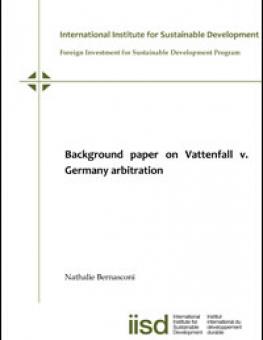
Background paper on Vattenfall v. Germany arbitration
This paper provides background on an investment dispute between the Swedish energy utility Vattenfall and the Government of Germany pursuant to the Energy Charter Treaty.
This paper provides background on an investment dispute between the Swedish energy utility Vattenfall and the Government of Germany pursuant to the Energy Charter Treaty (ECT). Vattenfall is seeking approximately 1.4 billion Euros in compensation from the Government of Germany, claiming that environmental restrictions placed on a coal-fired power plant would make the project uneconomical. In addition to providing background on the dispute, the paper describes the arbitration process under the ECT, a multilateral agreement governing foreign investments in the energy sector. The paper also discusses the ECT's implications for environmental law and policy making.
You might also be interested in
The State of Play in Vattenfall v. Germany II: Leaving the German public in the dark
Two years after Vattenfall brought Germany to international arbitration for a second time (Vattenfall II), the German public is still left out in the dark. This briefing note reviews the background to the case on Germany’s decision to phase out nuclear power and outlines its current state of play.
The German Nuclear Phase-Out Put to the Test in International Investment Arbitration? Background to the new dispute Vattenfall v. Germany (II)
The Swedish energy company Vattenfall has now followed through on its threat to bring an international arbitration claim against Germany in relation to that country's recent decision to phase out nuclear power. Damages claimed by Vattenfall could exceed €700 million.
Why the Energy Charter Treaty Modernization Doesn't Deliver for Climate
The Energy Charter Conference adopted the "modernized" Energy Charter Treaty (ECT) on December 3, 2024. IISD's Lukas Schaugg explains what the modernization does, when it will enter into force, its tension with EU law, and why the reformed ECT can still hinder climate policies.
The Responsible Agricultural Investment Tool for Agribusiness and Case Studies
This report summarizes a collaboration to support agribusinesses in complying with principles of responsible investment in agriculture and food systems.